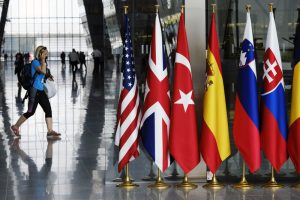Last month, U.S. President Joe Biden and his French counterpart Emmanuel Macron called each other to patch things up after the almighty diplomatic spat over AUKUS. The world’s oldest alliance is back on track, for now. But recent polling shows that the AUKUS spat hit a raw nerve, touching on a fundamental difference in European and American views on the nature of the transatlantic relationship.
New data in polling commissioned by the Chicago Council on Global Affairs and the European Council on Foreign Relations suggests that the recent reconciliation may only be enough to tide the relationship through to the next crisis. Both Americans and Europeans tend to view their countries’ relationships abroad with a degree of realism. For many, these international relationships are based on a strategic necessity rather than shared interests and values. But this is much more the case for Europeans than it is for Americans.
When asked whether Americans and Europeans viewed a series of countries as allies, necessary partners, rivals, or adversaries, the U.S. responses suggest that Americans have far greater confidence in alliances based on shared interests and values, whereas Europeans feel that they live in a world of shifting strategic, and issue-based partnerships.
Americans are much more likely to sense a natural alliance with the European countries included in their poll (France and Germany) than European publics do for their countries’ ties to the U.S. Europeans are more likely to consider the U.S. a necessary partner (44 percent) than an ally (21 percent). For their part, Americans are more likely to see France (52 percent ally, 24 percent necessary partner) and Germany (45 percent ally, 27 percent partner) as allies than they are to view them as strategic partners. If governments are reading the public mood, the U.S. disregard for their French partner in their AUKUS decision should have come as no surprise to the Élysée. And from an American point of view, perhaps the calculation was that the transatlantic bond was too longstanding and solid to be affected by a small ephemeral matter such as a nuclear submarine contract.
The data reveal another large difference between EU and U.S. public opinion on the main impetus for the AUKUS submarine deal: Washington’s growing military and technological competition with China. While China is seen by neither the U.S. nor the EU as an ally, U.S. respondents were much more likely to place a competitive framing on the relationship than EU respondents. A majority of Americans consider China either a rival (32 percent) or an outright adversary (29 percent). Europeans are more likely to consider China a necessary partner (36 percent) or a rival (25 percent).
Our data suggest that the political grounding for a pivot to Asia is clearly far stronger in the U.S. than in Europe. In the U.S., Japan is most likely to be seen as an ally, with 44 percent of respondents choosing this option, while only 15 percent say the same in the EU, only the third largest answer. And the importance of engaging other partners beyond China in the Indo-Pacific seems to be something that unites both the European and American publics. India is the one power where responses are most similar: a plurality in both American and EU publics see New Delhi as a necessary partner.
Overall, the data imply that if the U.S. wants to bind Europe in as a partner in balancing Chinese influence in the Indo-Pacific, it needs recognize the fact that it cannot count on European publics to place strong pressure on their governments in support of this initiative. For now, this approach is seen to be more in the American than in the European interest. Europeans appear to see the transatlantic partnership in terms of give and take.

































